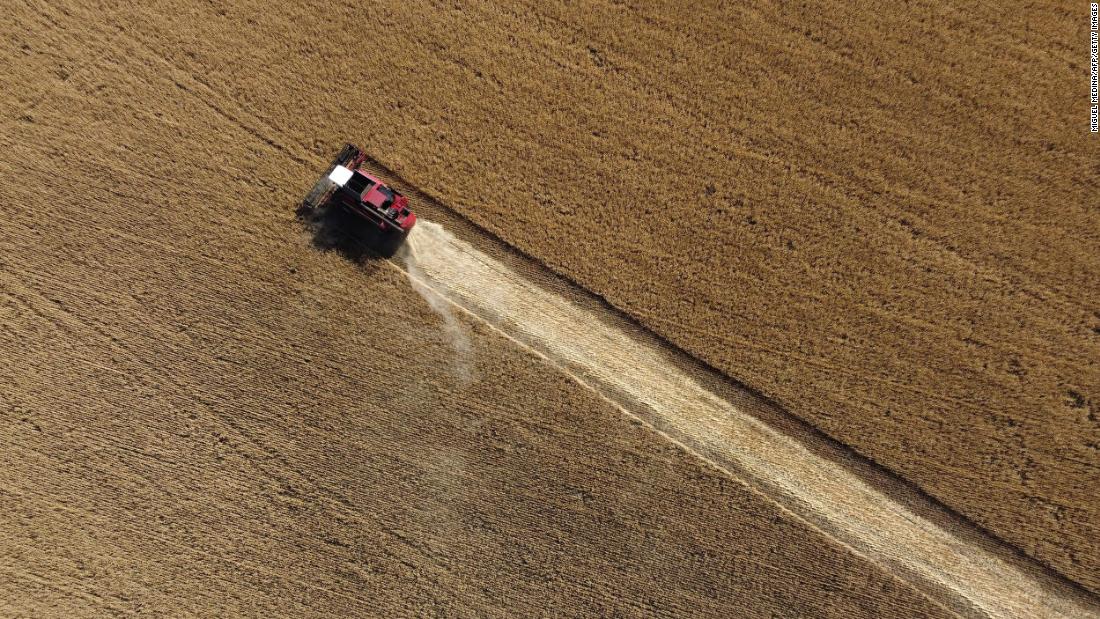US broadcasts new partnerships to spice up Ukraine’s agricultural sector and grain manufacturing

[ad_1]
Washington(CNN) The US is announcing three new partnerships on Thursday as an effort to boost Ukraine’s agricultural sector and help supply the country’s grain to the world, USAID officials told CNN.
The announcement is part of a deliberate effort by the Biden administration to build up Ukraine’s economy and alleviate the global food security crisis which has been exacerbated following Russia’s invasion of Ukraine.
Ukraine is regarded as a key bread-basket for much of the world, and the country relies on agriculture to generates more than 40% of total export revenues. The country’s economy shrank by more than 30% in 2022 after Russia’s brutal invasion destroyed infrastructure, hurt businesses and disrupted daily life, according to Kyiv’s economic ministry.
USAID’s new partnerships with Grain Alliance, Kernel, and Nibulon are projected to increase Ukraine’s grain shipping capacity by more than 3 million tons annually, the officials said. Each company has a long history of working in Ukraine.
Working together USAID and these organizations are planning to invest $44 million to support storage and infrastructure expansion in Ukraine’s agriculture sector.
This comes after USAID has announced multiple different initiatives to support Ukraine’s agriculture sector, including programs to specifically target Ukrainian farmers.
Earlier this year, one of the efforts included a new donation of high-quality vegetable seeds to Ukrainian farmers to help address the crisis created by Russian President Vladimir Putin’s full-scale invasion against Ukraine.
“Through AGRI-Ukraine, nearly 30% of Ukraine’s registered farmers have benefited with seeds, fertilizers, crop protection, storage, access to financing and other services, helping over 13,600 farmers deliver this year’s harvest and plant winter crops,” said a USAID spokesperson.
A Black Sea grain deal has also enabled the passage of Ukrainian ships carrying the agriculture products to depart the country, which was a challenge in the early days of the war with Russia preventing the ships from leaving.
“Thanks in large part to UN Secretary General Guterres and Turkiye the Black Sea grain deal initiative loosened Russia’s stranglehold on Ukraine’s ports, allowing more than 22 million metric tons of grain and other food -that’s the equivalent of 8 billion loaves of bread — to leave Ukraine sports for global markets, and that’s lowered the price of food for people everywhere,” US Secretary of State Antony Blinken said on Thursday in New Delhi where he attended a G20 Foreign Ministers meeting.
But Blinken warned that the current deal is set to expire later this month and Russia has not agreed to extend the vital agreement.
“Today, Russia is again slow-walking the export of food from Ukraine and with the Black Sea initiative set to expire on March 18 Russia has refused to commit to renewing it,” Blinken said.
Blinken said that countries at the meeting sent a clear message of the need to extend the deal.
The new investments that USAID and its partners are announcing this week will target multiple terminals — Izmail and Reni in Ukraine, both on the Danube River, and Čierna nad Tisou in Slovakia — where they expect to see an increase in grain exports. The operations will involve construction to renovate the areas where vessels are loaded.
To further grease the wheel on the Slovakia operations, Grain Alliance will purchase a transshipment storage facility in the country.
USAID’s funding is being used to procure grain loading equipment, temporary storage structures and remanufactured locomotives for use in Ukraine.
Just last week, US Treasury Secretary Janet Yellen was in Kyiv for a series of meetings and engagements, including with Ukrainian President Volodymyr Zelensky, to reaffirm the United States’ support of Ukraine and to announce the recent transfer of $1.25 billion in economic and budgetary assistance.
Yellen said she expects the Ukrainian economy’s growth to be weaker as the country loses foreign investment and runs through its reserves and rainy day funds, which means securing investments in Ukraine’s agriculture sector are even more vital.
“We will see an increasing toll on Russia’s economic trajectory over time,” she said. “And their ability to replenish the military equipment that’s been destroyed in their attacks on Ukraine, that’s been very greatly jeopardized.”
[ad_2]









